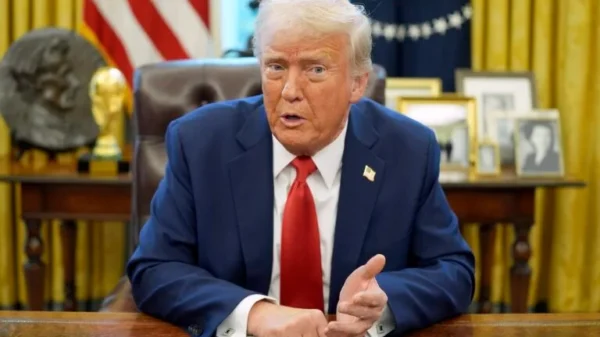The Ikeja branch of the Nigerian Bar Association (NBA) said the Nigerian Judicial Staff Union (JUSUN) called off its strike too soon without meeting its goal of financial autonomy for the judiciary.
The Nigerian News Agency (NAN) reports that the 64-day strike, the longest industrial protest action in Nigerian justice, was suspended on Wednesday, following a meeting between union officials and the National Council of the judiciary (NJC) headed by the Chief Justice of Nigeria (CJN), Judge Ibrahim Muhammad.
NAN reports that the courts are due to reopen on June 14.
Speaking to the Nigeria News Agency (NAN) on Thursday, Bartholomew Aguegbodo, president of the Ikeja branch of the NBA called the suspension of industrial action by JUSUN “not worth it”.
“After supporting the strike for over two months, the question JUSUN should have asked when considering calling off the strike is: what have we accomplished?
“The strike caused incalculable difficulties for lawyers and litigants. If you are fighting a noble cause and cannot support it, it is not worth starting it.
“The strike period was unsuccessful. JUSUN says he is suspending the strike and giving the government three months to implement the conditions, we know that after three months we will not be able to call for further action.
“The cancellation of the strike is quite regrettable, nothing has been achieved so far and it will remain as usual,” he said.
NBA President Ikeja noted that everywhere in the world there is no struggle that is priceless and that the struggle for the financial autonomy of justice is not only for JUSUN and the NBA.
Aguegbodo said the corporate world is also suffering from the non-financial autonomy of the judiciary.
He said a more effective method would have been joint action between JUSUN and other unions to lobby demands for judicial financial autonomy from state governors.
NAN reports that the JUSUN union called a nationwide strike on Tuesday, April 6, when the union ordered all its members across the federation to close all courts after the expiration of the 21-day ultimatum given earlier on the government failure to enforce the law.
NAN reports that a verdict from the Federal High Court in Abuja, the capital of Nigeria, ruled in January 2014 that the financial autonomy of the judiciary is a constitutional provision that must be respected by the executive branch of government.
NAN reports that on May 23, President Buhari issued the executive decree granting financial autonomy to the legislature and judiciary in the country’s 36 states.
The ordinance also mandates the Accountant General of the Federation to deduct at source the amount owed to state legislatures and magistrates from the monthly allowance to each state for states that refuse to grant such autonomy.
Federation Attorney General, Minister of Justice Abubakar Malami, said Executive Decree No.10 of 2020 made it compulsory for all states in the federation to include allocations from the legislature and the judiciary in the frontline charge of their budgets. .
According to the AGF: “A Presidential Implementation Committee has been established to develop strategies and modalities for the implementation of the financial autonomy of the legislature and the state judiciary in accordance with Article 121 ( 3) of the Constitution of the Federal Republic of Nigeria, 1999 (as amended). “
NAN reports that the Nigeria Governors Forum has said it will start implementing financial autonomy for the judiciary no later than the end of May, a pledge which indicated that the end of the ongoing strike that has crippled the country’s judicial system could be in sight.
The governors also called on the striking JUSUN members to call off their two-week strike at that time.
NGF Chairman Governor Kayode Fayemi of Ekiti gave this assurance in an interview with reporters after meeting with “stakeholders” from the state’s judiciary and legislature at the Presidential Villa in Abuja.
Fayemi said the implementation modalities were worked out during the meeting held at the Presidential Villa.
According to him, the meeting, chaired by President Buhari’s chief of staff, Ibrahim Gambari, brought together the solicitor general of the Federation, representatives of the judiciary, the Conference of Presidents and the House of Representatives.
The frontline prosecution statute, which is respected by the federal government with respect to the federal justice system, allows state justice systems to obtain funds owed to them directly from the Federation account. (NAN)
![]()






























































